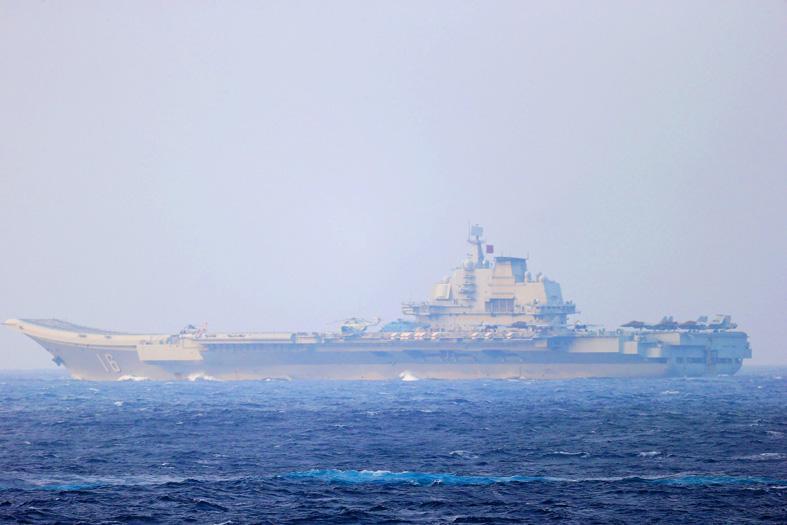The Chinese military yesterday said it had conducted live-fire drills in waters and airspace off Taiwan’s eastern and southwestern coasts from Friday to Sunday to test and upgrade its joint combat capabilities.
The Eastern Theater Command of the Chinese People’s Liberation Army (PLA) posted the news on Chinese messaging platform WeChat.
Over the past few days, authorities in Taiwan and Japan have observed deployments of Chinese planes and ships near Taiwan from a PLA carrier group of five destroyers, a frigate and a resupply ship led by the Liaoning aircraft carrier.

Photo: Reuters
The Japanese Ministry of Defense first announced on Monday last week that the Liaoning and seven escort vessels had left the East China Sea and passed between Japan’s Okinawa and Miyako islands before entering the Pacific Ocean.
From Tuesday last week to Saturday, fighter jets and helicopters were seen several times taking off and landing on the Liaoning, said the Japan Self-Defense Forces, which sent the JS Izumo helicopter carrier to monitor the movements.
In Taipei, the Ministry of National Defense said on its Web site on Sunday that Chinese Y-8 anti-submarine aircraft had on four consecutive days entered the southern and southeastern parts of Taiwan’s air defense identification zone (ADIZ).
On Friday, 18 Chinese military planes flew into the southwestern and southeastern parts of Taiwan’s ADIZ, the largest intrusion by Chinese military aircraft so far this month, the ministry said.
National Defense and Security Research analyst Su Tzu-yun (蘇紫雲) said that the Y-8 anti-submarine aircraft might have entered Taiwan’s southeastern ADIZ to conduct drills with the carrier group, which was in waters about 500km off Taiwan’s eastern coast.
The drills might have been an indirect message from Beijing of its unhappiness over the “internationalization” of the Taiwan issue, Su added.

ANOTHER EMERGES: The CWA yesterday said this year’s fourth storm of the typhoon season had formed in the South China Sea, but was not expected to affect Taiwan Tropical Storm Gaemi has intensified slightly as it heads toward Taiwan, where it is expected to affect the country in the coming days, the Central Weather Administration (CWA) said yesterday. As of 8am yesterday, the 120km-radius storm was 800km southeast of Oluanpi (鵝鑾鼻), Taiwan’s southernmost tip, moving at 9kph northwest, the agency said. A sea warning for Gaemi could be issued tonight at the earliest, it said, adding that the storm is projected to be closest to Taiwan on Wednesday or Thursday. Gaemi’s potential effect on Taiwan remains unclear, as that would depend on its direction, radius and intensity, forecasters said. Former Weather Forecast

As COVID-19 cases in Japan have been increasing for 10 consecutive weeks, people should get vaccinated before visiting the nation, the Centers for Disease Control (CDC) said. The centers reported 773 hospitalizations and 124 deaths related to COVID-19 in Taiwan last week. CDC Epidemic Intelligence Center Director Guo Hung-wei (郭宏偉) on Tuesday said the number of weekly COVID-19 cases reported in Japan has been increasing since mid-May and surpassed 55,000 cases from July 8 to July 14. The average number of COVID-19 patients at Japan’s healthcare facilities that week was also 1.39 times that of the week before and KP.3 is the dominant

The Chinese Communist Party’s (CCP) working group for Taiwan-related policies is likely to be upgraded to a committee-level body, a report commissioned by the Mainland Affairs Council (MAC) said. As Chinese President Xi Jinping (習近平) is increasingly likely to upgrade the CCP’s Central Leading Group for Taiwan Affairs, Taiwanese authorities should prepare by researching Xi and the CCP, the report said. At the third plenary session of the 20th Central Committee of the CCP, which ended on Thursday last week, the party set a target of 2029 for the completion of some tasks, meaning that Xi is likely preparing to

US-CHINA TRADE DISPUTE: Despite Beijing’s offer of preferential treatment, the lure of China has dimmed as Taiwanese and international investors move out Japan and the US have become the favored destinations for Taiwanese graduates as China’s attraction has waned over the years, the Ministry of Labor said. According to the ministry’s latest income and employment advisory published this month, 3,215 Taiwanese university graduates from the class of 2020 went to Japan, surpassing for the first time the 2,881 graduates who went to China. A total of 2,300 graduates from the class of 2021 went to the US, compared with the 2,262 who went to China, the document showed. The trend continued for the class of 2023, of whom 1,460 went to Japan, 1,334 went to